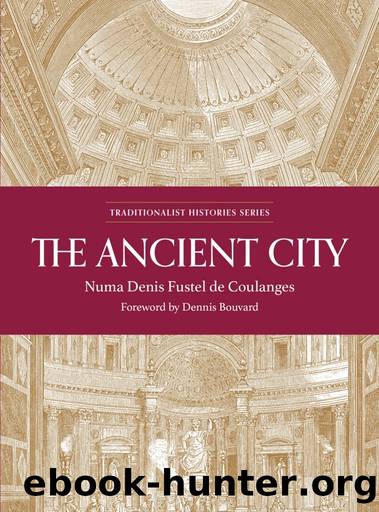The Ancient City: A Study of the Religion, Laws, and Institutions of Greece and Rome by Numa Denis Fustel de Coulanges

Author:Numa Denis Fustel de Coulanges
Language: eng
Format: azw3
Tags: Sociology, Philosophy, Religion, Politics, Classics, History
ISBN: 9780486447308
Publisher: Dover Publications
Published: 1864-03-01T00:00:00+00:00
CHAPTER XVI.
The Roman. The Athenian.
This same religion which had founded society, and which had governed it for a long time, also gave the human mind its direction, and man his character. By its dogmas and its practices it gave to the Greek and the Roman a certain manner of thinking and acting, and certain habits of which they were a long time in divesting themselves. It showed men gods everywhere, little gods, gods easily irritated and malevolent. It crushed man with the fear of always having gods against him, and left him no liberty in his acts.
We must inquire what place religion occupied in the life of a Roman. His house was for him what a temple is for us. He finds there his worship and his gods. His fire is a god; the walls, the doors, the threshold are gods;197 the boundary marks which surround his field are also gods. The tomb is an altar, and his ancestors are divine beings.
Each one of his daily actions is a rite; his whole day belongs to his religion. Morning and evening he invokes his fire, his Penates, and his ancestors; in leaving and entering his house he addresses a prayer to them. Every meal is a religious act, which he shares with his domestic divinities. Birth, initiation, the taking of the toga, marriage, and the anniversaries of all these events, are the solemn acts of his worship.
He leaves his house, and can hardly take a step without meeting some sacred objectâeither a chapel, or a place formerly struck by lightning, or a tomb; sometimes he must step back and pronounce a prayer; sometimes he must turn his eyes and cover his face to avoid the sight of some ill-boding object.
Every day he sacrifices in his house, every month in his cury, several months a year with his gens or his tribe. Above all these gods, he must offer worship to those of the city. There are in Rome more gods than citizens.
He offers sacrifices to thank the gods; he offers them, and by far the greater number, to appease their wrath. One day he figures in a procession, dancing after a certain ancient rhythm, to the sound of the sacred flute. Another day he conducts chariots in which lie statues of the divinities. Another time it is a lectisternium: a table is set in a street, and loaded with provisions, upon beds lie statues of the gods, and every Roman passes bowing, with a crown upon his head, and a branch of laurel in his hand.198
There is a festival for seed-time, one for the harvest, and one for the pruning of the vines. Before corn has reached the ear, the Roman has offered more than ten sacrifices, and invoked some ten divinities for the success of his harvest. He has, above all, a multitude of festivals for the dead, because he is afraid of them.
He never leaves his own house without looking to see if any bird of bad augury appears. There are words which he dares not pronounce for his life.
Download
This site does not store any files on its server. We only index and link to content provided by other sites. Please contact the content providers to delete copyright contents if any and email us, we'll remove relevant links or contents immediately.
The Lost Art of Listening by Michael P. Nichols(6474)
Why I Am Not A Calvinist by Dr. Peter S. Ruckman(3771)
The Rosicrucians by Christopher McIntosh(3049)
Wicca: a guide for the solitary practitioner by Scott Cunningham(2704)
Signature in the Cell: DNA and the Evidence for Intelligent Design by Stephen C. Meyer(2501)
Real Sex by Lauren F. Winner(2476)
The Holy Spirit by Billy Graham(2418)
To Light a Sacred Flame by Silver RavenWolf(2353)
The End of Faith by Sam Harris(2290)
The Gnostic Gospels by Pagels Elaine(2026)
Nine Parts of Desire by Geraldine Brooks(2007)
Waking Up by Sam Harris(1958)
Heavens on Earth by Michael Shermer(1955)
Devil, The by Almond Philip C(1899)
Jesus by Paul Johnson(1887)
The God delusion by Richard Dawkins(1848)
Kundalini by Gopi Krishna(1824)
Chosen by God by R. C. Sproul(1760)
The Nature of Consciousness by Rupert Spira(1689)
